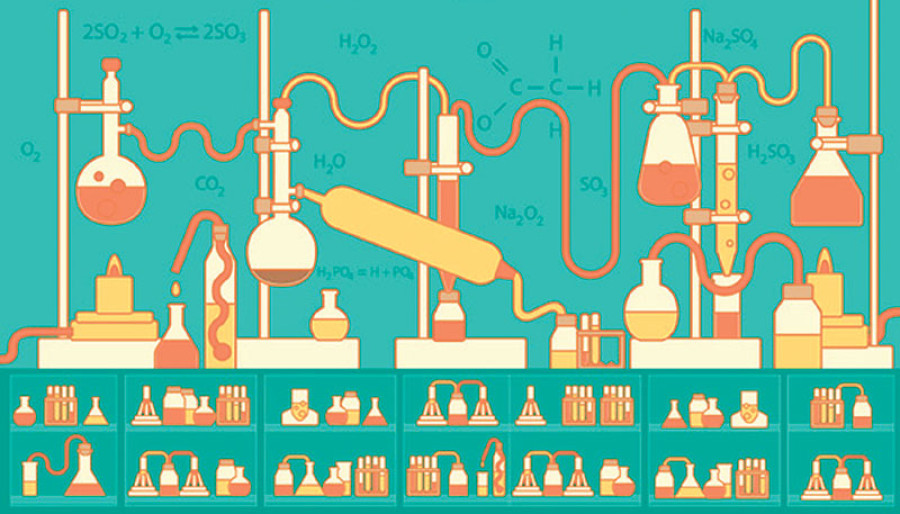Opinion
My science lab
Students must not be deprived of learning ideas and skills they should learn in their appropriate grades
Ananda Kafle
One day while in grade nine, I was at the quarters of my science teacher. There I saw a piece of glassware of about half a liter volume lying stray, which I felt I had seen somewhere before. I asked the teacher what the vessel was meant for. He kidded, “Don’t you know dear, it’s the very conical flask?”
I was so pleased to see that somewhat familiar apparatus, which I had seen only in diagrams in my science textbook. I immediately began imagining as to how a cork and a delivery tube (a bent glass tube used to pass gases prepared in laboratory through) could be fitted in it and how the oxygen gas prepared in the flask would be collected in a gas jar. The teacher explained how other various components looked like and fitted into the flask, and how the whole setup worked.
Our high school science teacher was a good teacher and could explain things very well. But we did not have a science lab in the school. There were a few essential apparatus, of course, which might have been purchased years before as a result of some ‘reform policy’. But there was no space for making use of or even storing them. Consequently, they were either seen lying idle somewhere or dumped in some corner like trifles. Larger vessels like beakers, conical flasks and measuring cylinders were used by the residents of staff quarters for different day-to-day purposes, for example, carrying water to use in the washroom. As a result, there was almost no ‘laboratory session’ in our school and we developed concepts of the experimental techniques and procedures just by imagination even up to class 10.
Fun with experimentations
College life began after passing the SLC exams. For intermediate level we had a good laboratory in our college where we performed different experiments, which we had only heard of until grade 10. I used to feel as if I had reached a beautiful place that I had only heard about in stories. Doing experiments not only reduced the enormous efforts required to memorise various experimental techniques, but also enhanced my interest in learning. Examination questions related to laboratory experiments would feel easy, since we could answer them simply by recalling the activities performed in the labs.
Through Bachelors and Masters degrees, a science student performs a lot of experiments depending on his/her subject; experiments on extracting natural products, testing dissolved chemicals in water or identifying mineral salts, estimating various chemicals in a sample, synthesising certain chemical compounds, and so on. Some of those experiments are more relevant than others in terms of real life circumstances.
Experimenting and learning
There is a Chinese proverb:“Tell me, I will forget; show me, I will remember; involve me, I will understand”. So a student learns better when allowed to engage in lab activities. In fact, in case of learning science in advanced levels, lab activities are not just supportive tools to make theories clearer, but are a separate and unavoidable discipline in their own right. Most of the findings in various areas of science and technology are a result of laboratory research. In case of basic studies like in high school, however, the purpose of practical courses is mainly to clarify the concepts of science, motivate students in their studies, impart fundamental skills on laboratory tasks and draw conclusions from actual observations. The closer the experiments are to real life, the more interesting they feel. Laboratory courses, if appropriately designed, can bring students closer to real life experiences, boost their learning and impart useful skills to them. These skills are meant to enhance their capabilities in handling research tasks in future.
Our schools and laboratories
Over the last few decades, things may have slightly changed. Nowadays, more schools in Nepal have science laboratories. But still, it is not enough. All high schools, government or private, must possess such facilities. Students must not be deprived of learning ideas and skills they should learn in their appropriate grades. Further, although in colleges and universities there are science laboratories, not all of them are up to standards. For example, a fully equipped, modern research laboratory of international standard is almost nonexistent in the country. As a result, no significant contributions are being made by the country’s research efforts in global arena. In a time when countries like China, South Korea, etc., which are growing in science and technology, have been making notable progress, we are still far behind.
Hence, for bettering the quality of science education and improving the country’s position in research and development, laboratories of proper standards should be built for all levels of study.
Kafle is pursuing a PhD in Tokyo University of Science




 16.96°C Kathmandu
16.96°C Kathmandu










